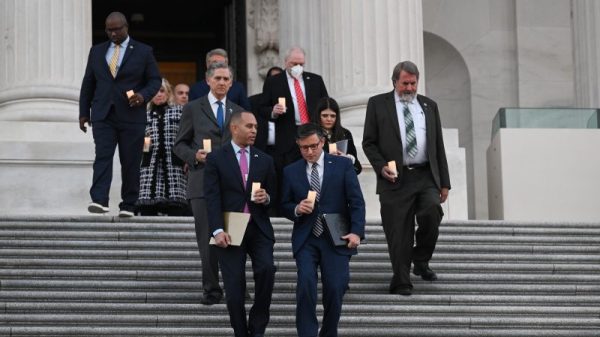The Supreme Court on Wednesday made it easier for workers to pursue employment discrimination claims over job transfers, unanimously siding with a female police sergeant in St. Louis who said she was reassigned to a less prestigious role because she is a woman.
Federal civil rights law prohibits employment discrimination on the basis of protected characteristics such as sex, race and religion. Congress passed Title VII to ensure equal employment opportunities and to eliminate discrimination in the workplace.
The issue for the justices was whether the statute guards against all discriminatory job transfers or requires an additional showing in court by the employee that the involuntary move caused a “significant disadvantage,” such as harm to career prospects or a change in salary or rank.
Justice Elena Kagan, writing for six justices, said that higher standard applied by some lower courts was wrong and employees instead must only show some harm.
“Although an employee must show some harm from a forced transfer to prevail,” Kagan wrote, “she need not show that the injury satisfies a significance test.”
In addition to civil rights groups, employment attorneys and some conservatives had been closely watching the case, believing that a broad ruling for the police sergeant could lead to an increase in reverse-discrimination claims against workplace diversity, equity and inclusion programs.
Jatonya Clayborn Muldrow sued the St. Louis Police Department after she was transferred in 2017 out of the intelligence division, from a position that allowed her to be deputized as an FBI agent, work a steady weekday schedule, and broadly investigate public corruption and human trafficking cases.
Muldrow said in court filings that her new assignment lacked the same prestige and benefits. Even though her pay remained the same, she lost her FBI privileges, had to work patrol and was assigned weekend shifts. Muldrow, who according to court filings was known as a “workhorse,” was replaced in the intelligence division by a male sergeant who previously worked with Muldrow’s male supervisor.
In her opinion Wednesday, Kagan wrote that Muldrow’s allegations meet the court’s new standard “with room to spare.”
“If those allegations are proved, she was left worse off several times over. It does not matter, as the courts below thought, that her rank and pay remained the same, or that she still could advance to other jobs,” Kagan wrote.
The decision aims to lower the bar for employees to proceed in court with a discrimination claim, allowing lawsuits that failed under the old standard to presumably succeed.
Although the court’s judgment in favor of Muldrow was unanimous, three justices — Clarence Thomas, Samuel A. Alito Jr. and Brett M. Kavanaugh — each wrote separately to explain their differences with their colleagues’ reasoning and their view of the ruling’s potential impact.
Alito said he doubted the court’s decision would make a meaningful difference and expects lower court judges will “mind the words they use but will continue to do pretty much just what they have done for years.” He called the opinion “unhelpful” because lower court judges, he wrote, will struggle to apply the new standard of harm.
Thomas also said there was “little practical difference” between the court’s new test and the current practice of appeals court judges.
Kavanaugh said he would have gone further and not required the worker to show they had suffered in any specific way other than being subject to a discriminatory transfer. Federal law, he wrote, “does not require a separate showing of some harm. The discrimination is harm.”
Employment attorneys said the court’s ruling will probably spark a greater number of discrimination claims beyond transfers, including challenges to certain DEI programs, and cause employers to assess whether some of their programs might be vulnerable to challenges under the new “some harm” standard set by the court.
“Does this mean the end of [DEI]? I don’t think so,” said Alyesha Asghar, an attorney with Littler Mendelson and the co-chair of the firm’s practice group for equal employment opportunity and diversity.
Some groups, including the NAACP Legal Defense Fund, said they doubted the ruling would have an impact on DEI because many employment-related programs do not rely on race.
Rather, such programs are “fundamental to fulfilling employers’ Title VII obligations to create workplaces that are free from discrimination and in which everyone feels included and valued,” said Amalea Smirniotopoulos, senior policy counsel and co-manager of the defense fund’s Equal Protection Initiative.
In Muldrow’s case, a district court judge in Missouri had sided with the city, saying Muldrow had not proved that her transfer caused sufficient disadvantage. The U.S. Court of Appeals for the 8th Circuit agreed, finding that Muldrow could not proceed with her lawsuit because she failed to demonstrate that the transfer amounted to an “adverse employment action” that caused tangible harm.
The Supreme Court said Wednesday that nothing in the text of Title VII requires courts to distinguish between job transfers that cause “significant disadvantages and transfers causing not-so-significant ones.”
“And that difference can make a real difference for complaining transferees. Many forced transfers leave workers worse off respecting employment terms or conditions,” Kagan wrote.
The justice pushed back on concerns from the city that employees would inundate the court system with meritless, burdensome claims. “There is reason to doubt that the floodgates will open in the way feared,” she wrote, because employees must still show some injury.
The Supreme Court’s opinion sends the case, Muldrow v. City of St. Louis, back to the lower courts for additional proceedings that account for the high court’s ruling.
Robert Loeb, the lawyer for the police department, said in a statement he was pleased that the court had retained a requirement that employees show “some harm.” The city “looks forward to showing on remand why [Muldrow] cannot meet that standard,” he said.







































